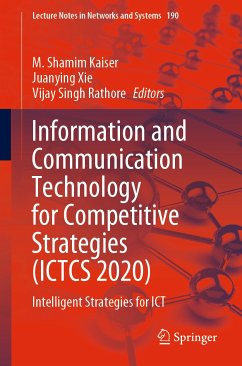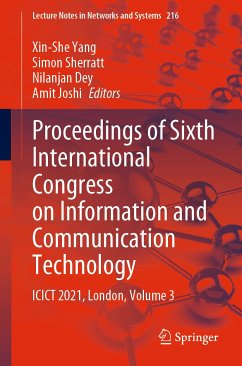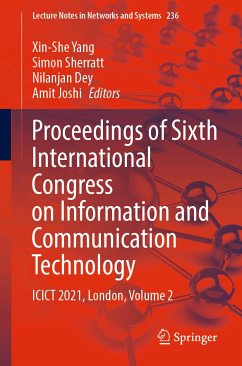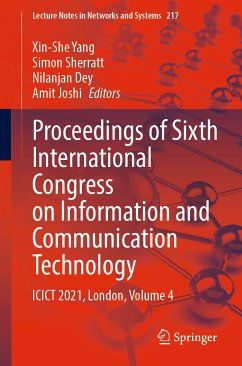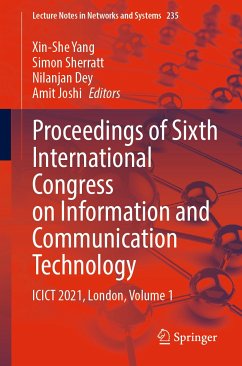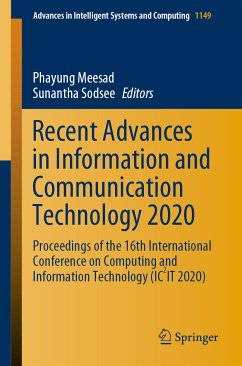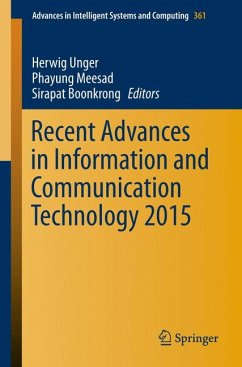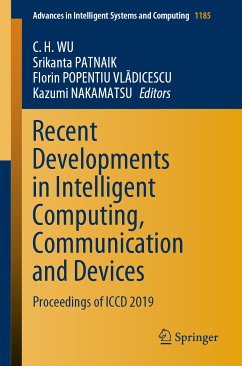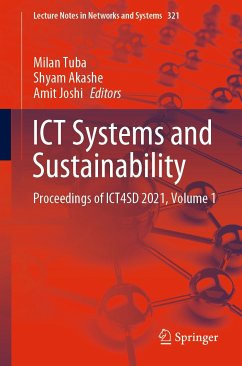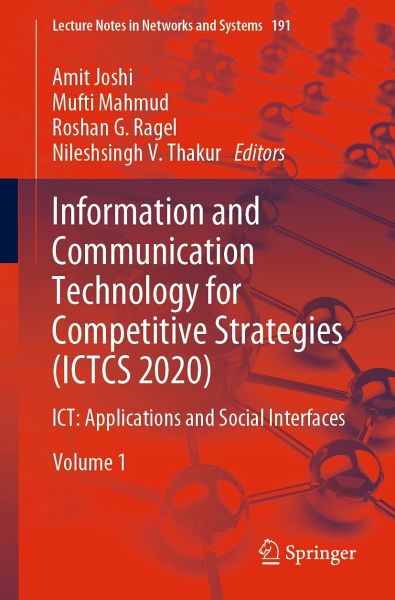
eBook, PDF
Information and Communication Technology for Competitive Strategies (ICTCS 2020) (eBook, PDF)
ICT: Applications and Social Interfaces
Redaktion: Joshi, Amit; Thakur, Nileshsingh V.; Ragel, Roshan G.; Mahmud, Mufti

PAYBACK Punkte
81 °P sammeln!





This book contains the best selected research papers presented at ICTCS 2020: Fifth International Conference on Information and Communication Technology for Competitive Strategies. The conference was held at Jaipur, Rajasthan, India, during 11-12 December 2020. The book covers state-of-the-art as well as emerging topics pertaining to ICT and effective strategies for its implementation for engineering and managerial applications. This book contains papers mainly focused on ICT for computation, algorithms and data analytics, and IT security.
Dieser Download kann aus rechtlichen Gründen nur mit Rechnungsadresse in A, B, BG, CY, CZ, D, DK, EW, E, FIN, F, GR, HR, H, IRL, I, LT, L, LR, M, NL, PL, P, R, S, SLO, SK ausgeliefert werden.
- Geräte: PC
- ohne Kopierschutz
- eBook Hilfe
- Größe: 31.58MB
Dr. Amit Joshi is currently Director of Global Knowledge Research Foundation, also Entrepreneur & Researcher who has completed his Masters and research in the areas of cloud computing and cryptography in medical imaging. Dr. Joshi has an experience of around 10 years in academic and industry in prestigious organizations. Dr. Joshi is Active Member of ACM, IEEE, CSI, AMIE, IACSIT, Singapore, IDES, ACEEE, NPA and many other professional societies. Currently, Dr. Joshi is International Chair of InterYIT at International Federation of Information Processing (IFIP, Austria). He has presented and published more than 50 papers in national and international journals/conferences of IEEE and ACM. Dr. Joshi has also edited more than 40 books which are published by Springer, ACM and other reputed publishers. Dr. Joshi has also organized more than 50 national and international conferences and programmes in association with ACM, Springer and IEEE to name a few across different countriesincluding India, UK, Europe, USA, Canada, Thailand, Egypt and many more. Dr. Mufti Mahmud received his Ph.D. degree in Information Engineering (specialized in neuroengineering) from the University of Padova - Italy in 2011. A recipient of the Marie Curie postdoctoral fellowship, Dr. Mahmud has served at various positions in the industry and academia in India, Bangladesh, Italy, Belgium and the UK during the last 17 years. Dr. Mahmud aims to leave behind a healthy, secure and smart world to live in. As Expert of neuroengineering, computational intelligence and data science, his research aims to build predictive, secure and adaptive systems for personalized services to improve quality of life through advancement of healthcare access in low-resource settings. Senior Member of IEEE and ACM, and Professional Member of BCS, Dr. Mahmud holds leadership roles at many technical committees, such as Vice Chair of the Intelligent System Application Technical Committee of IEEE Computational Intelligence Society, Member of the IEEE CIS Task Force on Intelligence Systems for Health, Co-Chair of the IEEE P2733 Standard on Intelligent systems design, with AI/ML, Member of the IEEE R8 Humanitarian Activities Subcommittee and Project Liaison Officer of the IEEE UK and Ireland Special Interest Group on Humanitarian Technology. Dr. Mahmud serves as Associate Editor of the Cognitive Computation, IEEE Access, Brain Informatics and Big Data Analytics journals. He also serves at many technical, programme and organization committees of high-rank conferences including the Local Organizing Chair of IEEE-WCCI2020; General Chair of BI2020; and Programme Chair of IEEE-CICARE2020. Dr. Roshan Ragel is Full Professor in Computer Engineering at the University of Peradeniya, Sri Lanka. He is Skilled University Lecturer and Researcher with a doctorate in computer science and engineering and a passion for teaching, research and administration. His research interest is in the areas of fault-tolerant and dependable computing, accelerated and high-performance computing, wearable computing and synthesis of secure and reliable embedded processors. Prof. Ragel received his Ph.D. in Computer Science and Engineering from the University of New South Wales, Australia, in 2007, and his B.Sc. in Engineering from the University of Peradeniya, Sri Lanka, in 2001. He was appointed Senior Lecturer in Computer Engineering at the University of Peradeniya in December 2007 and Full Professor since October 2017. Prof. Ragel has co-authored about 150 peer-reviewed articles in topics including Micro-Architectural Support for Reliability and Security in Embedded Processors (SoC), Internet of Things (IoT), Side-Channel Attacks and Countermeasures, Application Specific Processor Design, High-Performance Computing such as Hardware/Software Acceleration of Bioinformatics Algorithms, Wearable Computing, Format-Preserving Digitisation and OCR of LocalLanguage Text, and Completely Automated Public Turing test to tell Computers and Humans Apart (CAPTCHAs) in the Context of Mobile Applications. He has won several best paper awards in conference papers, the most prolific Sri Lankan author award from Elsevier Research in 2017 and the Presidential award for scientific publication in Sri Lanka in 2018. He was a visiting research scholar at the UNSW, Sydney, a few times and UIUC, Illinois, once. He is Senior Member of the IEEE and the IEEE Computer Society. Dr. Nileshsingh V. Thakur received Ph.D. in Computer Science Engineering from Visvesvaraya National Institute of Technology, Nagpur, India, on 1st February 2010. He is having over 28 years of teaching and research experience. Presently, he is Professor in the Department of Computer Science and Engineering at Prof Ram Meghe College of Engineering and Management, Badnera, Amravati, India. He is the author or the co-author of more than 80 scientific publications in international journals, international conferences and workshops. He is Editor of the books published by Tata McGraw-Hill and Springer. Under his guidance, 6 research scholars have completed Ph.D. and 28 scholars have completed M.Tech. He is an editorial board member of 6 international journals. He acted as Programme Committee Member of various international conferences. He is a reviewer for IEEE & IET Image processing Journals. He delivered more than 60 keynote/expert talks at international and national conferences, and training programmes. He is certified ISO Auditor and worked as External Expert in the selection board for recruitment of Scientist-B for DRDO, India. His research interest includes image and video processing; robotics and vision; pattern recognition and neural network; smart camera and sensor networks; big data analysis; nature-based computing algorithms and evolutionary approaches.
Produktdetails
- Verlag: Springer Nature Singapore
- Seitenzahl: 1156
- Erscheinungstermin: 26. Juli 2021
- Englisch
- ISBN-13: 9789811607394
- Artikelnr.: 62322121
Für dieses Produkt wurde noch keine Bewertung abgegeben. Wir würden uns sehr freuen, wenn du die erste Bewertung schreibst!
Eine Bewertung schreiben
Eine Bewertung schreiben
Andere Kunden interessierten sich für


